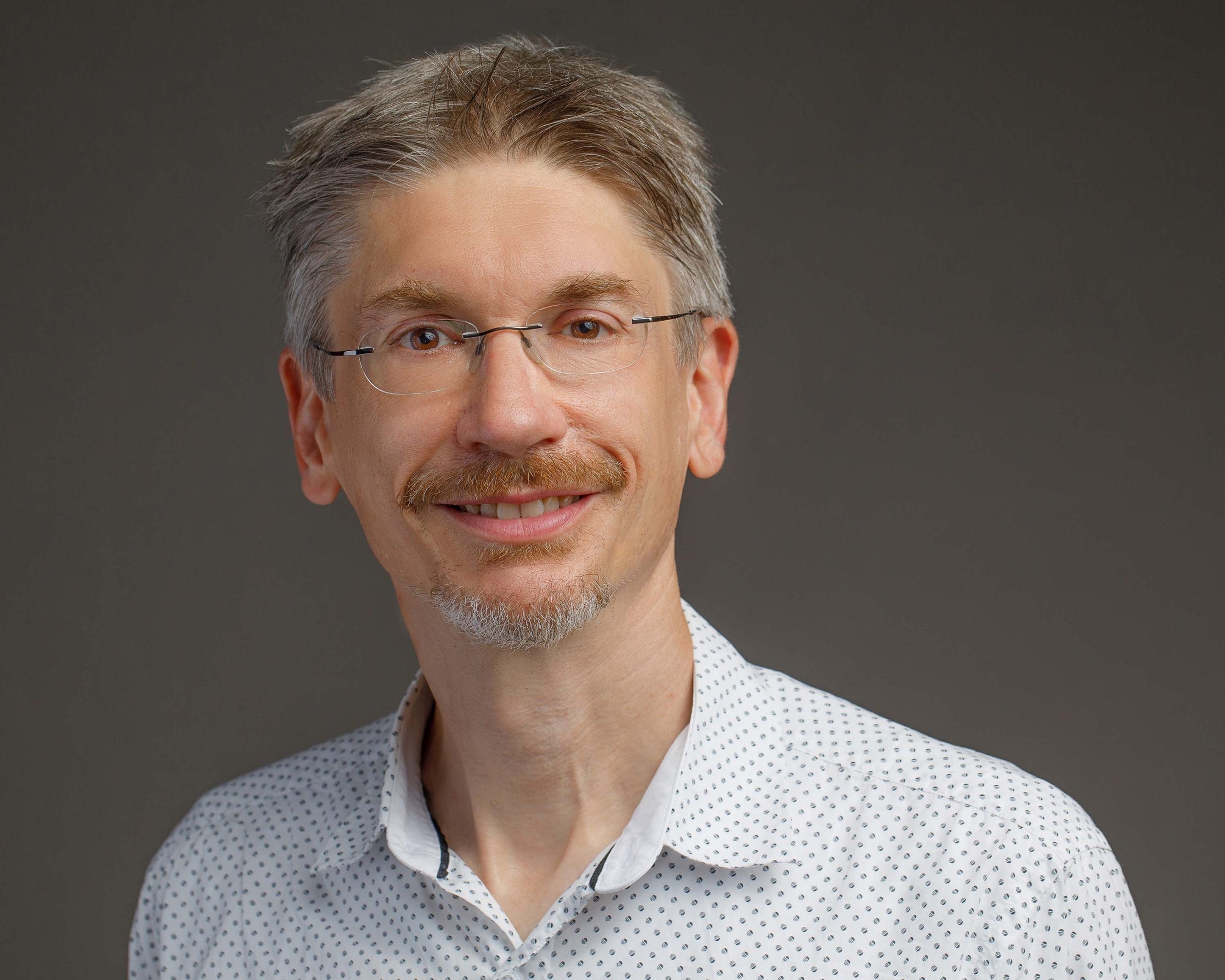Desktop Site Content
Principal Investigator
Mobile Site Content
Principal Investigator
Shared Site Content

Thomas Biederer
Professor
Yale School of Medicine
Department of Neurology
100 College Street
New Haven, Connecticut 06510
Phone: (203) 737-3416
Email: thomas.biederer@yale.edu
Connect: LinkedIn / ResearchGate / Google Scholar / Publons / PubMed
Short Biography
Thomas Biederer received his undergraduate degree in Biochemistry from the Freie Universität in Berlin, Germany. Thomas then earned a Ph.D. in Cell Biology from the Humboldt-Universität zu Berlin for his studies of membrane protein quality control in the secretory pathway with Dr. Thomas Sommer at the Max Delbrück Center for Molecular Medicine, Berlin. Combining his deep-seated interests in neuroscience and membrane biology, Thomas pursued postdoctoral training at the University of Texas Southwestern Medical Center at Dallas under the mentorship of Dr. Thomas Südhof. At UT Southwestern, Thomas investigated mechanisms of synapse formation and the roles of synaptic adhesion molecules, and he characterized the first synaptogenic proteins of the immunoglobulin superfamily in the vertebrate brain. He became faculty member at Yale University in 2003, and joined in 2013 the Tufts University Medical School. In 2019, Thomas was recruited to the Yale School of Medicine where he is faculty member in the Department of Neurology.
Thomas is intrigued by synapse biology. His long-term goal is to understand synapse development, from molecular to in vivo levels. His entry point to study these questions are the adhesion molecules spanning the synaptic cleft, protein complexes that his group has helped to identify and characterize. On a molecular and cell biological level, research in his group has revealed that interactions by SynCAM immunoglobulin proteins across the cleft can successively function during axo-dendritic contact and synapse formation, and later shape synapses. His group has in addition demonstrated that SynCAMs have signaling roles. Pursuing long-standing interests in molecular approaches, his laboratory also has performed the first localization of adhesive cleft complexes on a nanoscale. His lab members extend this program to investigate synapse-organizing mechanisms in vivo. In fact, most members of his lab combine molecular and in vivo approaches in their research, which offers the opportunity to approach related questions from very different angles. This progress has led to the recognition that trans-synaptic SynCAM complexes are both necessary and sufficient to drive synapse development in the brain. His laboratory has additionally demonstrated that proteins spanning the synaptic cleft can modulate synaptic plasticity. Among the most recent progress of his group are the results that SynCAM molecules organize the formation of excitatory synapses onto interneurons and control network maturation in the cortex. Our next aims are to define the mechanisms that instruct synapse formation using innovative approaches such as superresolution imaging of sub-synaptic protein distribution, single particle tracking of synapse-organizing molecules to measure their surface dynamics in live neurons, and proteomic studies of synapse composition. A group of truly outstanding collaborators works with his group to reach these goals together. His laboratory also applies these research capabilities to identify nutritional interventions that promote circuit wiring and synapse stability. Attaining these goals is of importance to human health as altered synapse formation, maturation, and maintenance underlie neurodevelopmental and psychiatric disorders, and synaptic aberrations are linked to drugs of abuse.
Curriculum Vitae
Yale School of Medicine
Professor, Department of Neurology
USDA Human Nutrition Research Center on Aging, Boston
Senior Scientist, 2021 – Present
Yale School of Medicine
Associate Professor, Department of Neurology, 2019 – 2024
Tufts University School of Medicine
Associate Professor, Department of Neuroscience, 2013 – 2019
Yale University
Associate Professor, Department of Molecular Biophysics and Biochemistry, 2009 – 2013
Yale School of Medicine
Member, Program in Cellular Neuroscience, Neurodegeneration and Repair, 2005 – 2013
Yale University
Assistant Professor, Department of Molecular Biophysics and Biochemistry, 2003 – 2009
UT Southwestern Medical Center, Dallas
Postdoctoral Fellow with Thomas C. Südhof, 1999-2003
Topic: Synapse formation and organization in the vertebrate central nervous system
Max-Delbrück-Centrum, Berlin
Research Fellow with Thomas Sommer, 1998
Topic: Functions of the ubiquitin/proteasome system at the endoplasmic reticulum of S. cerevisiae
Max-Delbrück-Centrum, Berlin
Graduate Student with Thomas Sommer, 1995-1997
Topic: Characterization of the ubiquitin system at the endoplasmic reticulum of S. cerevisiae
Humboldt-Universität zu Berlin, Germany
Ph.D. in Biology with specialization in Cell Biology, 1998, summa cum laude
Freie Universität Berlin, Germany
Diploma in Biochemistry, 1995
Freie Universität Berlin, Germany
Study of Biochemistry, 1991-1994
Universität Regensburg, Germany
Study of Biochemistry, 1989-1991
Brain Research Foundation
Brain Research Foundation Fellow, 2016
University of Bordeaux
Initiative d’Excellence Award, 2016
Brain & Behavior Research Foundation (Formerly NARSAD)
Young Investigator Award, 2009
Dana Foundation
Program in Brain and Immuno-Imaging Scholar Award, 2009
National Institute on Drug Abuse
Nominee for Presidential Early Career Award (PECASE), 2006
March of Dimes Foundation
Basil O’Connor Starter Scholar Research Award, 2005
The Brain Tumor Society
Paul Daniel Bogart Leadership Chair of Research Award, 2004
Human Frontier Science Program
Long-term Postdoctoral Fellowship, 1999 – 2001
German Society for Cell Biology
Boehringer-Mannheim Prize for Young Scientists, 1998
Studienstiftung des deutschen Volkes (“German National Merit Foundation”)
Studienstiftung des deutschen Volkes Scholarship, 1990 – 1994
Bayerische Hochbegabtenförderung (“Bavarian Bursary for Gifted Students”)
Bayerische Hochbegabtenförderung Scholarship, 1989-1994
For a list of all published papers, please visit our Publications page.
Educational Activities
2022 – present Medical Student Course CTW/INP 510 Connection to the World, Neuroscience Content Leader
2021 – present INP 702, Foundations of Cellular and Molecular Neurobiology
2019 – present INP 701, Principles of Neuroscience
Manuscript Review
Nature, Science, Cell, Neuron, Nature Neuroscience, eLife, PNAS, Science Advances, Journal of Neuroscience, Nature Communications, EMBO Journal, Journal of Cell Biology, Development, PLoS Biology, PLoS Genetics, Journal of Biological Chemistry, Structure, Cerebral Cortex, Journal of Physiology, Journal of Comparative Neurology, Biological Psychiatry, Developmental Neurobiology, Molecular and Cellular Neuroscience, European Journal of Neuroscience, Journal of Neurochemistry, Neuroscience Letters, Human Molecular Genetics, FEBS Letters, Proteomes, PLoS One, Nature Reviews Neuroscience, Trends in Neurosciences, Trends in Molecular Medicine, Frontiers in Bioscience, Springer; Publons peer reviewer profile available at this link
Federal Grant Review
NIH Special Emphasis Panel Early Stage Clinical Trials and Development of Pharmacologic or Device-Based Intervention (2023)
NIH Study Section NC Neuronal Communications (ad hoc 2022)
NIH Study Section SYN Synapses, Cytoskeleton, Trafficking (ad hoc 2011, 2012, 2015, 2021)
NIH Special Emphasis Panel K99/R00 Awards (2020)
NIH Special Emphasis Panel K99/R00 Awards (2020)
NIH Special Emphasis Panel Synapses & Neurodegeneration (2019)
NIH Special Emphasis Panel T32 Training Grants (2018)
NIH Special Emphasis Panel Synaptopathy (2017)
NIH Special Emphasis Panel MDCN Complex Brain Disorders (2014)
NIH Fellowship Study Section Neurodevelopment, Synaptic Plasticity, and Neurodegeneration (ad hoc June, Oct 2013)
National Science Foundation (2005, 2006, 2020)
Other Grant Review
Simons Foundation Autism Research Initiative (SFARI), Deutsche Forschungsgemeinschaft, Medical Research Council, French National Research Agency, Fondation pour la Recherche Médicale, Swiss National Science Foundation, Dutch Research Council, Research Foundation Flanders, Research Grant Council of Hong Kong, Alzheimer’s Association, Yale/NIDA Neuroproteomics Center, Carman Trust, Jeffress Trust
Methods for modulating transcriptional activation using Mint proteins
Inventors: Thomas C. Südhof, Thomas Biederer, Xinran Liu
Date of Issue: March, 2001
U.S. Patent Application 09/821,861



